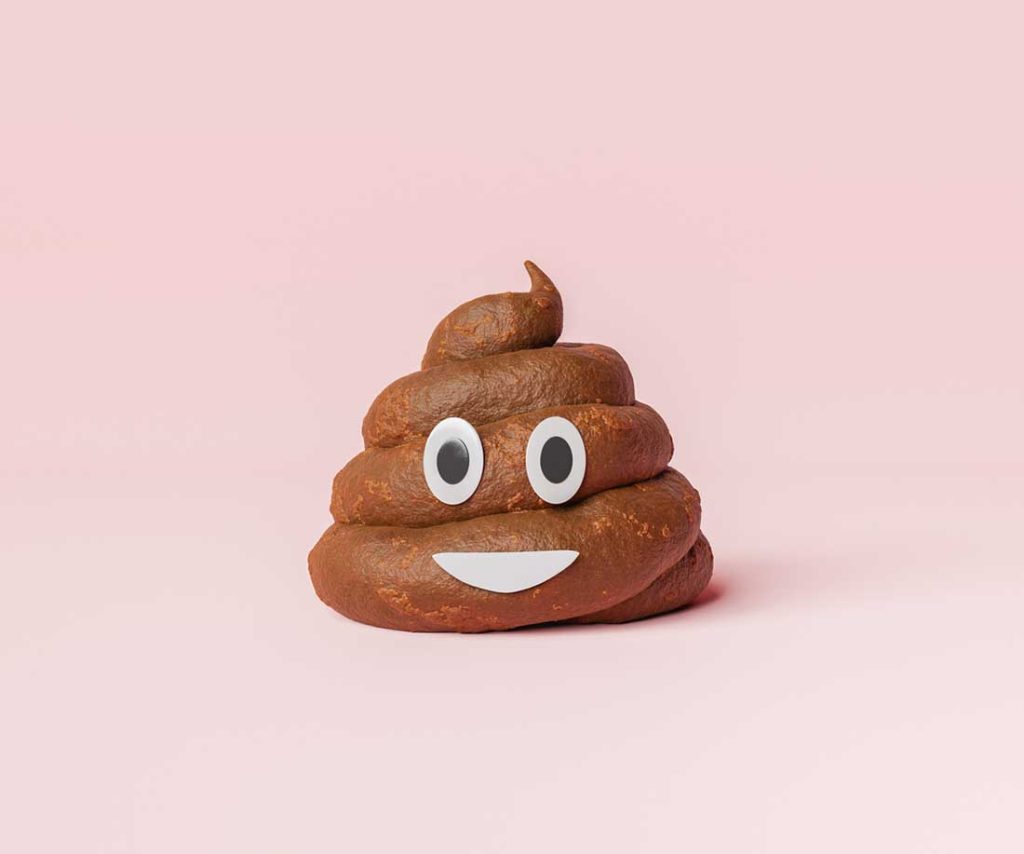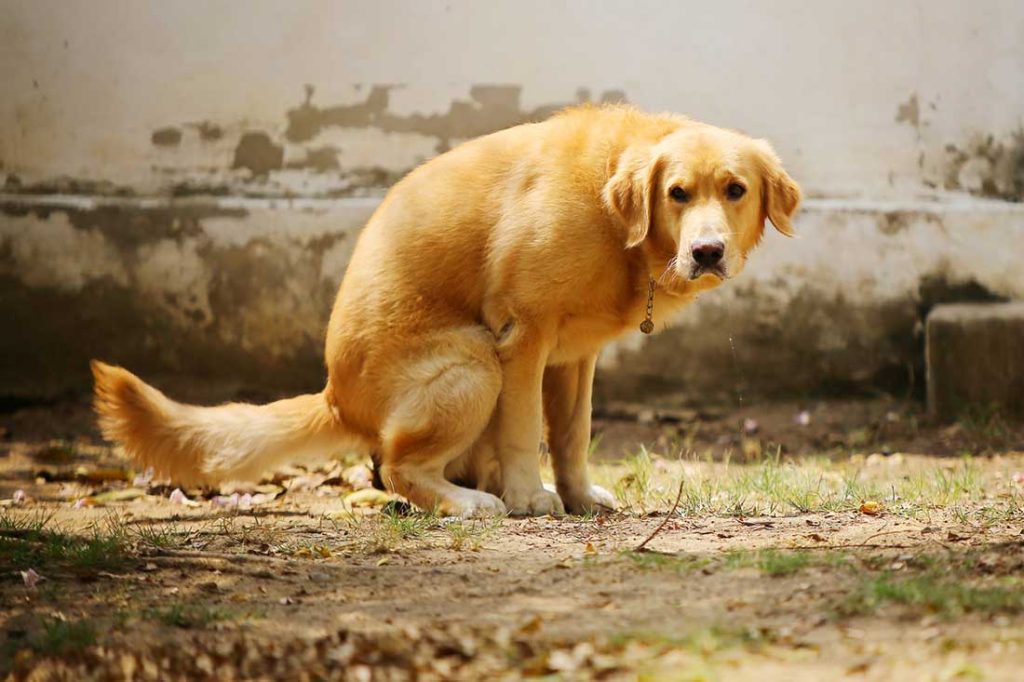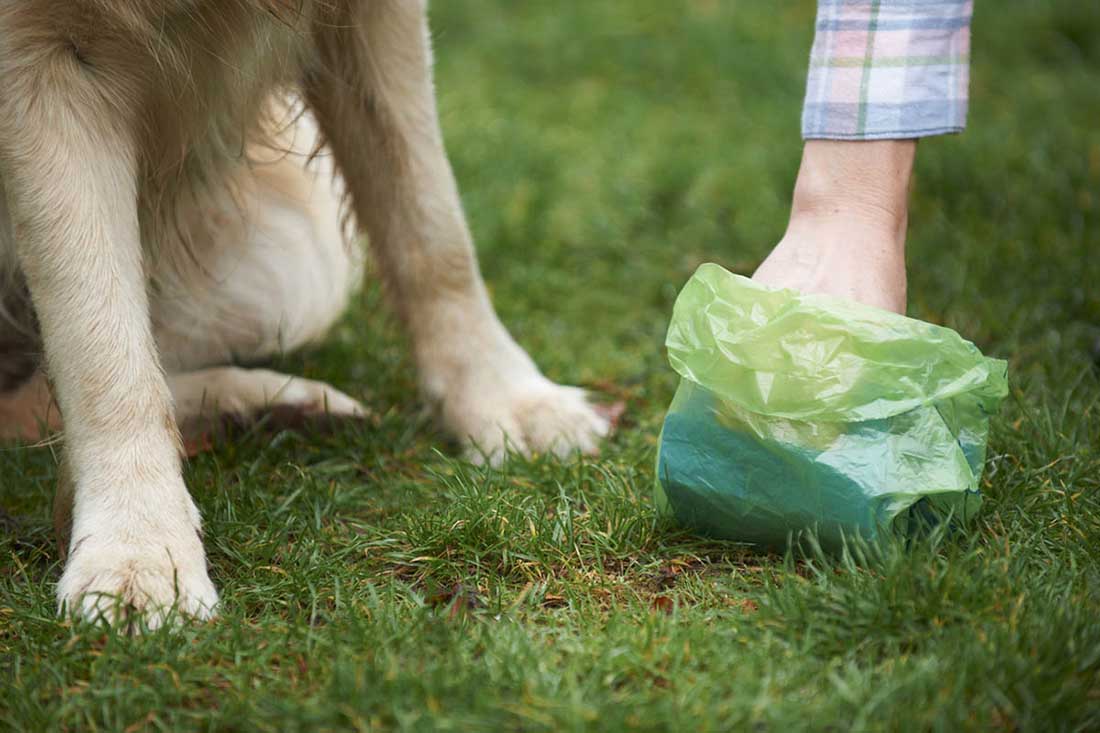Everybody Poops by Taro Gomi is a best-selling picture book written to make potty training more fun for toddlers. “An elephant makes a big poop. A mouse makes a tiny poop. Everybody eats, so everybody poops.”
I can imagine a similar book just on dog poop. Just me? “A St. Bernard makes a big poop. A Chihuahua makes a tiny poop.” We know everyone eats, so everyone poops, but what’s a “normal” poop, and how many times a day should a dog poop?
These are relevant questions for concerned pet parents. You probably know that keeping your dog’s poop schedule consistent can reduce constipation – or at least alert you to a potential blockage or other health issues.
So what is the typical poop frequency? How often should you expect to clean up your dog’s bowel movements? Let’s find out.
What Makes for Healthy Dog Poop?

Dog poo can tell you a lot about their overall health. Veterinarians say healthy dog poo is firm, long, and tube-shaped. They consider a brown or dark brown color normal. There shouldn’t be foreign objects in your dog’s poop. No weird strings, random socks, or white specks. (The latter can indicate worms, while the others indicate indiscriminate eating.)
Since bowel movements are the way bodies eliminate waste, other poo colors or consistency can give you hints about potential health issues. For example, a runny stool could indicate an upset stomach or other digestive issues. A soft, black stool could indicate bleeding in the digestive tract.
Such poo changes can relate to sudden changes in your dog’s diet and your dog’s digestive system struggling to handle it. Or changes in your dog’s stool could hint at serious underlying health issues like liver or kidney disease if your pup has ongoing bouts with watery stools or diarrhea, which can cause dehydration, which strains the kidneys.
It’s not surprising that Cornell Veterinary School says if your dog has diarrhea for more than two days, you should definitely call your veterinarian.
While diarrhea isn’t something pet parents will ignore, there can be other changes to your pup’s poo worthy of note too. In fact, any change in poo habits are clues to your dog’s health.
- Is there a change in the consistency or color of the poo?
- Is there a change in the number of times your dog defecates in a day?
Any changes in your dog’s diet or environment can change your dog’s bowel movements.
How Often Should Dogs Poop?
While there’s no one-size-fits-all poop schedule, the frequency of how many times a day your dog poops varies by dog. Age, activity levels, and the dog’s diet can all affect your dog’s poop schedule. Typically, dogs have one or two bowel movements daily, but some have three or four.
It can also depend on your walking schedule. If your dog relies on you to take them out to poo, then you want to make sure you get out within 30 minutes of mealtime because they’ll likely need to relieve themselves in some capacity.
Usually, puppies poo more often than adult dogs because they eat more frequent meals. If you’re feeding your puppy five or six small meals a day, then it makes sense they’ll have a higher poop frequency than dogs eating twice a day. Then, senior dogs might poop more often, too, because they may have health issues.
Why Is My Dog Pooping So Much?

Diet changes, stress and anxiety, intestinal parasites, not getting out enough, and getting older can all play a role in your pooch’s poop frequency. Additionally, eating grass, twigs, or other outdoor materials can affect your dog’s poop habits.
Diet Changes
If you’ve ever heard the recommendation to change your dog’s diet gradually, this is why. Sudden changes in dog food can spike gastrointestinal illness. We recommend a gradual shift to your dog’s diet that allows the digestive tract to adjust. Of course, if your pooch is a dumpster diver, that can also cause an upset stomach.
Another reason for more frequent poos could be extra food. Could your dog be eating more? Getting fed by a neighbor or eating the cat’s food or another dog’s food could all contribute to more frequent poos.
Intestinal parasites
Dogs can pick up intestinal parasites like roundworms, hookworms, or other parasites, making your pooch very sick. Symptoms include:
- white spots in dog poo or whitish poo
- fatigue
- vomiting
- diarrhea
- weight loss
If your pup shows any such symptoms, getting them to the veterinarian for an evaluation is a good idea. Parasites are highly contagious, unpleasant, and can be fatal.
Stress and Anxiety
Dogs can feel anxious, just like people. Whether it’s a fear of loud noises, a new routine, or separation anxiety, these feelings can cause diarrhea and more frequent pooping. If your pooch starts defecating in the house, ask yourself if it could be stress-related.
Infrequent Potty Breaks
At a minimum, your adult pup needs to get out three times a day, but most dogs benefit from more frequent outings. Not only for potty breaks but to sniff the neighborhood and enjoy the mental stimulation of going outside.
Puppies and senior dogs will need more frequent outings. With potty training puppies, you’re reinforcing that bathroom duties should happen outside. Senior dogs can benefit from that reinforcement, too.
Older Dogs
As dogs age, they may forget their potty training or have physical or medical problems that make it difficult for them to restrain themselves. For example, arthritis in the hips can make it tough for seniors to get into the proper position to defecate. Or nutritional deficiencies could spark more frequent bowel movements.
Why Does Your Dog Strain to Poo?
If your dog seems to poop normally and then starts straining to poo, that’s worth noticing because it could mean there’s a serious issue like a blockage in the gut. However, there can be many things causing a dog to strain.
For example:
- Dietary changes
- Blocked anal glands
- Constipation
- Obstruction in the gut
- Lack of exercise
- Enlarged prostate in intact male dogs
- Certain medications
If your dog goes 48-36 hours without a bowel movement, they may be constipated. Try additional exercise to get the digestive system moving. Ultimately, there can be many underlying causes of a decrease in poo frequency or volume. Your veterinarian can test a stool sample to assess your dog’s health.
When Should You Worry About Your Dog Pooping?
By now, you have an idea of what constitutes a “normal” poop. It’s firm, shaped like a cylinder, brown, and happens 2-5 times a day. When you pay attention to the frequency of your pup’s poo and its appearance, you develop a sense of what’s normal for your dog. Then, when there are changes, you can monitor them and see if they return to normal within a day or so.
Overall, you can tell a lot about your dog’s health by the color and consistency of your dog’s poo. It all ties back to what your dog eats and their digestive health. If your pup has chronic digestion problems, they may benefit from a diet change to healthy whole foods.
Citations
“Diarrhea | Cornell University College of Veterinary Medicine.” n.d. Www.vet.cornell.edu. Accessed June 12, 2024. https://www.vet.cornell.edu/departments-centers-and-institutes/riney-canine-health-center/canine-health-information/diarrhea.
This content is for informational use only and does not replace professional nutrition and/or medical advice, diagnosis, or treatment. It is not a substitute for and should not be relied upon for specific nutrition and/or medical recommendations. Please talk with your veterinarian about any questions or concerns.
